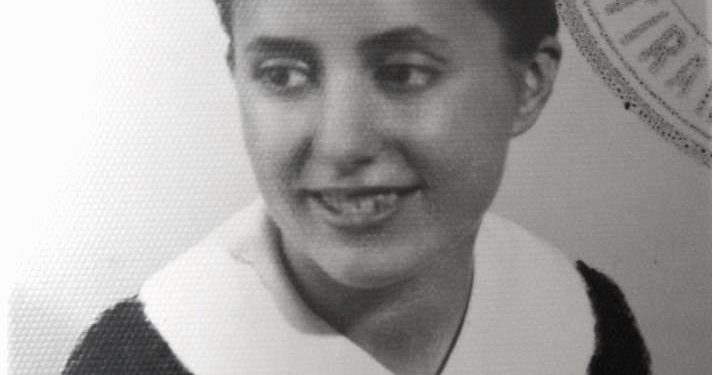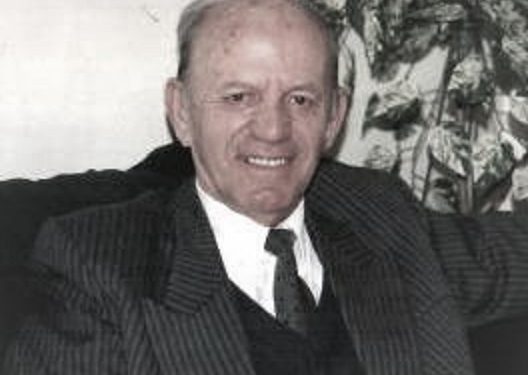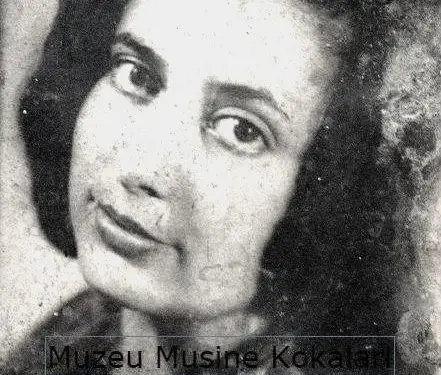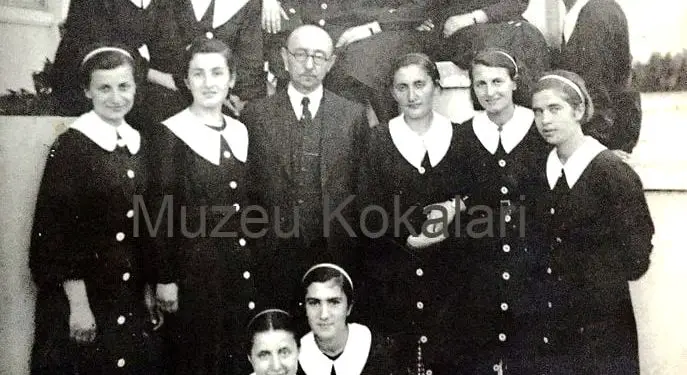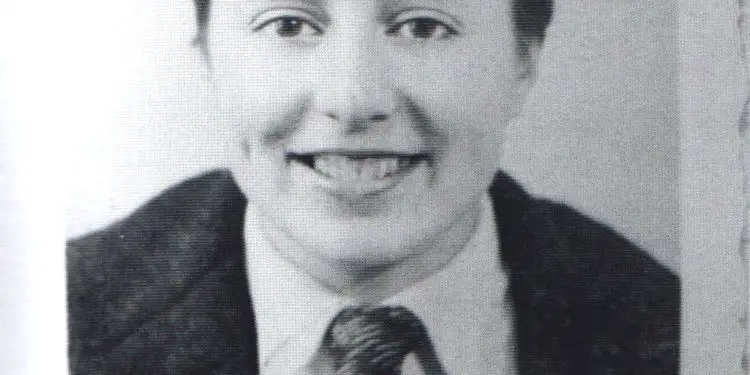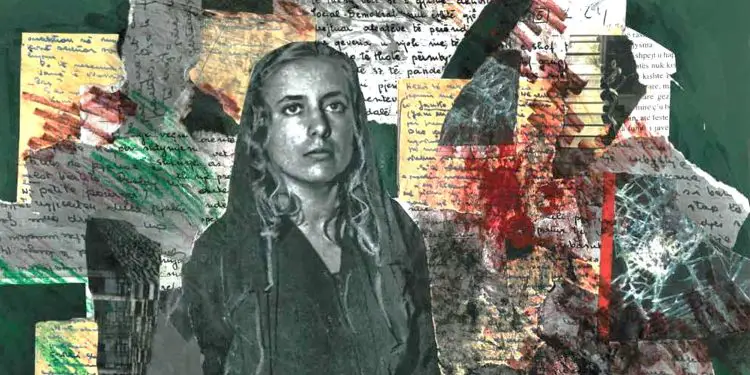By Makensen Bungo
The first part
Memorie.al/ A century ago, in the family of the Albanian jurist Reshat Kokalari, who then lived in the city of Adana in Turkey, after three sons, a daughter, who was named Musine, was born amid great joy. Four years later, the patriot Reshat Kokalari, moved from Turkey and headed for his homeland, in the city of Gjirokastra. In the stone town this little girl spent her childhood and finished primary school. Later, this family moved to the capital, where daughter Musine started and finished high school “Nana Mbretneşe”.
When she was a student, the name of this girl named Musine was mentioned as a writer, then as a politician, as a patriot, as the founder of the Social Democratic Party, later as an anti-communist, as a prisoner and, finally, as an interned. During the dictatorship, her activity was condemned and her name was smeared. After the collapse of communism, her activity was hymned and her name was mentioned with honor and respect.
On the occasion of the 100th anniversary of her birth, the Albanian intellectual world, wherever she is, remembered her name with great respect and honor, calling her a heroine, because only heroines think, act, fight, stay, torture and die like this girl , under the name Musine Kokalari.
***
Iconic
Musine Kokalari had a short life, but with a great patriotic activity, varied and courageous. It is a flower in the field of Albanian letters, a bloody flag in the fight against communism, a magnificent tombstone of democracy. This girl combined talent and courage. She used her talent to write the works she left us; her courage was seen in the fierce fight with the dictatorship. She had a great thirst for knowledge and culture. He grew up with different books in his hands and died with them on his chest. They are her inseparable companions.
He wrote books for the people, because he wanted them to learn, and parts for children, so that they would grow up cultured. She collected many folk songs, but she herself never sang. Collected wedding customs, but never became a bride herself. In the minds and hearts of the people she remained an unmarried bride. He entered the cultural world of the country with dignity, being respected by personalities of Albanian culture such as Koliqi, Xhuvani, Kolea, Poradeci, etc.
He hated fascism, Nazism and communism. Together with her friends, she formed the Social Democratic Party of Albania, as an alternative for the liberation of Albania. He participated in the first anti-communist opposition group, which was founded to block the way to the Slavic-communist dictatorship, which had released its bloody claws towards the forest land.
The dictatorship fought her fiercely, shot her two brothers without trial, arrested her twice, brutally tortured her, kept her in prisons for nearly two decades, interned her all her life, but she stood stoically against it and remained a tombstone. Musine Kokalari was a great woman in our Albania. It shed light in a place without knowledge. He worked for the unification of the people, when they were divided.
She sacrificed her life in the fight against communism for the freedom and democracy of the people. Dictatorship died and tried to disappear. The people suffered in his heart and today he teaches us from the pedestal, where the Albanian nation placed him, how to fight for the unification of the people, for the well-being of the forest land and for our democracy.
***
CHRONICLES FROM HER LIFE
February 10, 1917: Born in Adana, Turkey.
1921: Her family returned to Albania and settled in Gjirokastër, where she headed the primary school.
1930: Her family moves to Tirana.
1937: Finishes high school: “Nana Queen” in Tirana.
1939: Publishes her first book; “As my old grandmother tells me.”
1941: He successfully completed his university studies in Rome, at the Faculty of Literature and Fine Arts and graduated; Doctorate in literature, with the subject; “Albanian literature, Naim Frashëri”
1943: Together with Skënder Muço, Isuf Luzaj and Abaz Omar, he founded the Social-Democratic Party of Albania.
1944: Publishes the newspaper “Voice of Freedom”, organ of the Social-Democratic Party.
1944: Publishes her second book;”Around the hearth”.
12.1.1944: Her two brothers, Mumtaz and Vesim Kokalari, were shot without trial.
16.11.1944: Arrested and held in prison for 17 days and released.
January 1945: Publishes her third book;”How much life shook”!
January 23, 1946: Arrested for the second time by the People’s Defense Forces.
July 2, 1946: Sentenced to 20 years in prison, forced labor and confiscation of property.
1961: He was interned in Rrëshen.
1973: Retired on half pay.
1981: Sick with cancer, but the communist doctor, a member of a dictatorship family, who treated her, deliberately delayed her treatment.
1983: August: dies in Rëshen.
28.4.1993: President of the Republic of Albania Prof. Dr. Sali Berisha, decorates it with the medal; “Martyr of Democracy”
11.2.1997: A commemoration was held in Tirana by the Association of former Democratic Political Victims, where the political and literary activity of that person was discussed, an album titled; “Mesazh” and the 9-year school in the “Kombinat” neighborhood, was named after her.
11.2.2017: the 100th anniversary of her birth was commemorated in Albania, Kosovo and the USA
Writer
Musine Kokalari is first mentioned as a writer. She started writing in her youth. It was the years 1935 – 1937, when in the press of her time, her sketches signed with the pseudonym “Muse” began to appear, some of which are placed with the title; “Song of poverty” with subtitles: “Roads”, “Fire”, “Dance of life”, “Shoes”, and with the title;
“Destroyed hearth”, with the subtitles: “Largesa”, “With life” and “Mother and son”. In addition to the published sketches, he also left us some unpublished ones.
That girl, brought up in a progressive family, with a patriotic father and democratic brothers, growing up, was deeply impressed by the miserable condition of our people at that time, and in her sketches she described that condition with shocking descriptions and with the thought needed change the condition of our people. It should be mentioned that at that time, progressive ideas were forming in this girl.
Then, in the Albanian press, there were also other literary girls’ signatures, but these later disappeared and in the field of Albanian literature, only the name of this girl remained and continued to shine throughout her life.
As we have said, the writer Musine Kokalari has published three complete works, which we have mentioned above. These works caused a stir, not only because they were written by a young girl, but because of their literary value. They are written in a flowing style, with descriptions with feeling, with a pure language of Gjirokastra’s speech, with beautiful literary figures, based on the description of the customs of that city and the folklore of those parts.
They describe the Albanian world that had begun to fade and the author’s longing for that world. It is worth mentioning that the writer described the city of Gjirokastra with great longing, after a long absence. For concretization, to prove what we expressed above, we are marking a fragment from the work: “How life shook”, “The place where you left and grew up is the first love that takes root in our hearts. Past, beautiful dream. Small town, big world that has no friends for the minor who takes his first steps in life. Unforgettable memories of the first age, passing before the eyes like the filtered waters of the river that always flows, flows and flows, and never returns.
As for her Gjirokastra, she is expressed with great longing: “Gjirokastra, the big, endless world that had no friends for my first age. Gjirokastra is brave, its sides are full of rocks and the roads are full of stones. Gjirokastra of uphills and downhills. Old Gjirokastra, living in misery and poverty. “Gjirokastra of horses and songs”! Haven’t we also remembered, after a while that we left, the place we left and the city where we spent our youth, that golden part of life?
Writer Musine Kokalari, in her article; “Literature and the writer”, it has been expressed that; “Literature is the art of writing artistically, reflecting social life objectively. The writer is that master, who exercises literature for the benefit of humanity, on a national and international scale, with the pen. He makes generalizations about the world, about people and about everything that is related to people and all peoples, for their awakening, for their happiness. The writer reproduces life through artistic generalizations, which are called artistic figures.
What the writer Musine Kokalari says in this article, we read in her works. From these works, this writer has been called the founder of children’s literature, she has been deservedly placed on the glorious table of our writers, and her name has been mentioned in an Italian encyclopedia and has been appreciated by personalities of Albanian culture.
We are listing some of those ratings:
Dr. Sabile Kecmezi:
“Literary critics estimate that she is, without a doubt, the most talented female Albanian writer”.
Sotir Kolea:
“I have not seen anything better than what I saw in ‘Around the hearth’, therefore I have given it as an example for young people who want to learn how to hold a pen”
Sotir Kolea:
“The part that you took me from ‘How much life shook’ was snatched from my hands the day it came and remained in the hands of the world for more than a month. He came back late, everyone was waiting for him like cold water; who sang it twice, who three or four times, shooting because he was singing it to friends”.
Lasgush Poradeci:
“Musine Kokalari enters directly into the essence of psychology and immediately coexists with what she tells us.”
Ali Ndërvalla:
“The first book; ‘As my old mother tells me’ and the new book; “Around the hearth” is proof of a healthy talent”.
Ali Ndvarvalla:
“Musine Kokalari has a talent that deserves to be noted. The book ‘As my old mother tells me’ is the evidence of literary production that really has a folkloristic value. In this work, Musine Kokalari also has an artistic value of a writer, who begins to produce with love and passion something good, valuable for our letters.
Ziaudin Kodra:
“With this work, our author opens, in an original way, the path of that part of literature, which we would call; “Literature for children”.
Petraq Risto:
“The first Albanian writer, fresh water lilac, bride with a glass veil. Your tongue oozes honey and gold, your feelings flow and we drink and are not satisfied”.
Angelo Leotti (Italian):
“I have read and re-read and continue to read and re-read your wonderful book; ‘As my old mother tells me’. It is really well written and I offer you my warmest congratulations.”
Carlo Taliavini (Italian):
“I can tell you that you have long been known as a unique voice in Albanian literature.”
It should be added that Musineja, as it turns out from the notes of some fragments that we have read, from the conversations that took place with Musineja and from some articles published in the daily press, that in addition to the daily works that we mentioned above, he also wrote works other articles and has collected a large folklore material, during the time in prison and especially in exile, as stated by Mrs. Ildishane Kalo:
“The chairman of the People’s Council had ordered to close the door to the room of the dead with a key, until the people of the Branch came tomorrow, to check and take what was left. Musineja had written over 1000 pages, the work of all those years from the folklore of Mirdita and from what he had collected in prisons. When they opened the door the day after we arrived, no manuscript was found. Even the dead had been robbed by the hyenas.”
Where, then, did all that scientific material that that great woman collected in the dark time of prisons, or during the tedious time of exile, when she worked as a construction worker, end up? Did you tear up?Did you like it? Back to paper? Was it placed in any archives? Is it in that woman’s file? Or was it stolen? Was it published in a journal? Or did someone submit it and get a scientific title?
It would be good if, with the encouragement of the Minister of Culture, the former Institute of the Politically Persecuted and the “Musine Kokalari” Association, all the material of this great woman, the manuscripts, the unpublished works, the articles published by her, the material folklore of 1000 pages, the various literary and folklore manuscripts that were handed over to her relatives, the writings published by different people about this heroine and the works published by her herself and published in a complete work. This work would help to present the personality of this heroine as well as possible.
THE UNIVERSITY
After finishing high school, she, as per the tradition of the Kokalari family, as per the example of her grandfather, father and brothers, went to Italy to continue her university studies and settled in Rome.
He enrolled in the Faculty of Literature and Fine Arts and studied the works of the writers of the Western world, learned about their lives and completed his university studies brilliantly. In 1941 it was washed; Doctorate in Literature with the subject; “Albanian Literature – Naim Frashëri”.
As he achieved excellent results all the time after finishing his university studies, Musine was offered to stay at the university.But she did not accept. She was from an Albanian family, she herself was brought up with love for the motherland and thought to work for Albania and serve the people of her country.
This is how the young people of that time thought and acted: they studied all the time carefully, they finished brilliantly, they were offered to stay at the university where they studied, but they did not accept. They returned to their homeland to serve the newly reborn Albania. And they worked for Albania without any claims.
Politician
When she returned to her homeland, she stayed at the “Venus” bookstore, which her brothers had opened, and for a while she worked as a teacher at the high school where she had once been a student. Seeing the condition of Albania at that time of war, she analyzed the two political forces operating in Albania and to strengthen the fight against the invaders decided that, together with her friends; Skender Muço, Abaz Omari and Isuf Luzaj, in November 1943, formed a party, which they named the Social-Democratic Party of Albania.
Musine Kokalari is the only Albanian girl who, together with her friends, founded a political party and worked with self-denial at her head for the good of Albania as a determined patriot.
Here is the program of this party:
- The Social Democratic Party’s main goal is to ensure social justice and political freedom.
- The Social Democratic Party is evolutionist in terms of economic collectivism and ensures human rights.
- The party’s main goal is to provide the farmer with enough land to work, to eradicate exploitation, speculation and parasitism. It will also provide the proletarian with bread, faith and all other aids to make life pleasant. Agrarian reform will be the first stage of land distribution. The party will try to implement a social security system for the protection of all social classes.
- Political freedom consists in ensuring the right that every citizen has to have freedom of speech, of thought, of the press, of private initiative and of voting (parliamentary opposition). The party will strive to create premises that contribute to the democratic education of all classes of the Albanian people and their preparation for the future regime, where social justice and political freedom will reign. Political freedom in social justice finds the first cause of its limitation.
- As for relations with foreign nations, the party will be inspired not by a narrow selfish nationalism, but by a simple patriotism, which agrees with feelings of respect and sympathy for the patriots of foreign nations and will support the development of the idea of realizing a Balkan confederation as soon as possible.
- The party aims to fight against any occupier for the independence of a united Albania within its ethnic borders. Memorie.al
The next issue follows




